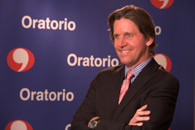 Comfortable in a crowd, their very oxygen coming from contact with others, most extroverts enjoy public speaking a whole lot more than their introverted peers. At least that’s been my impression from 15 years of media training and speech coaching. But are they necessarily better at it? Not always.
Comfortable in a crowd, their very oxygen coming from contact with others, most extroverts enjoy public speaking a whole lot more than their introverted peers. At least that’s been my impression from 15 years of media training and speech coaching. But are they necessarily better at it? Not always.
I’ve seen supremely self-confident men and women swagger up to a podium full of bravado but lacking in preparation, only to completely bomb. They try to wing it, and find they’ve run out of material in 30 seconds. I’ve also seen shy people take the time to prepare and practice, and then deliver moving, funny, impactful messages in a way that influences audiences and advances their own agendas.
An introvert herself, Susan Cain, author of "Quiet: The Power of Introverts in a World that Can't Stop Talking," offers excellent strategies for introverts in the extrovert-friendly cultures of Harvard Business School and Wall Street. And the #1 tip she offers in her section titled “Public Speaking for Introverts” at the back of the book is: Preparation is key.
And she's right. Yes, there are some exceptional people who can speak beautifully on a moment's notice and without notes for 15 minutes. But for most of us that leads to certain disaster. So to all you introverts who’d rather walk barefoot on broken glass than stand and speak in front of a room full of people, consider these tips:
1. Take the time to prepare. As far in advance of your presentation as possible, write out the storyline. Give it a powerful opening. Tell the audience why they should care. Back up your main points with interesting storytelling and elegantly simple visuals, avoiding "death by PowerPoint." Ask your audience for their support. End on a memorable closing note. And then:
2. Practice out loud. Repeatedly. Some people fear speaking in public so much that they can't even bear to practice; they think "I'll just go up there and if I don't hyperventilate and pass out, at least I'll get through it." Bad idea. Yes, I can hear you saying it’s impossible to find time in your crazy schedule to do this, but simple out-loud practice is the best way to overcome your shyness. Go into a room and shut the door. Stand and deliver the presentation with passion. If you do this several times, the information will become second nature to you, and you won’t suffer the anxiety that comes with not being quite sure where you’re headed.
3. Breathe. I make a habit of performing the following breathing exercise just before I deliver a presentation: Inhale to a count of five. Exhale to a count of 10. Do 15 reps of this and it will have a calming effect.
4. Visualize. Do as pro athletes do. Play a little movie in your brain of yourself succeeding at the task you’re about to perform. If you’re at the foul line in the NBA finals, you would envision the ball going nothing-but-net before you take the shot. If you’re about to be introduced before your speech at a conference, close your eyes for a moment and imagine yourself striding onto the stage with confidence and delivering a performance that makes you and your agenda look good. In a sense, you’ve “already been there” once you do this, and thus the fear of the unknown is minimized.
5. They like you. They really like you. Remember that, in most situations, the audience wants you to succeed. It’s boring and awkward to watch someone dying up there on the stage, so draw strength from the knowledge that the audience is genuinely hoping that you’ll entertain and inform. And if you happen to spot audience members who are yawning, rolling their eyes, or texting, to heck with ‘em. Make eye contact with someone who’s smiling or nodding her head in agreement. Instant confidence booster.
And by the way, these tips work for extroverts as well. You may not lack for self-confidence, but you'll always deliver a much better presentation if you do some homework beforehand.



 Ever the master communicator, Maggie Smith's Lady Violet Crawley understands the importance of staying on message. Remember how she strong-armed poor Dr. Clarkson to stick to the story that Sybil had only the tiniest chance of survivial after preclampsia set in? She did this because Sybil's mother Lady Grantham still thought Sybil might have survived if she had been taken to the hospital for a C-section, which Lord Grantham had opposed on another doctor's recommendation.
Ever the master communicator, Maggie Smith's Lady Violet Crawley understands the importance of staying on message. Remember how she strong-armed poor Dr. Clarkson to stick to the story that Sybil had only the tiniest chance of survivial after preclampsia set in? She did this because Sybil's mother Lady Grantham still thought Sybil might have survived if she had been taken to the hospital for a C-section, which Lord Grantham had opposed on another doctor's recommendation.
